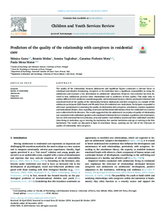Abstract
The quality of the relationship between adolescents and significant figures constitutes a relevant factor to emotional and adaptive functioning. Caregivers at the institution have a significant responsibility in caring for adolescents and represent a key determinant in adolescents’ adaptation. However, less attention has been devoted to how adolescents perceive these relationships and to predictors of their quality. This study aims to analyze different level predictors (sociodemographic and institutional hystory-related, emotional/relational and contextual level) of the quality of the relationship between adolescents and their caregivers, in a sample of 326 adolescent participants (228 female and 98 male) from 20 residential care institutions. Participants responded to self-report questionnaires concerning the quality of relationship with caregivers, attachment, emotion regulation and institutional climate. Data regarding structural and functional information about the residential care context were collected with the directors. The results suggested that the adolescents’ perception of quality of relationship was associated with individual (gender) and emotional/relational factors (emotion regulation and attachment), but not with contextual factors (cohesion, ratio and number total children/youth) and other individual variables (time living in institution, age at entering the institution, live another institution and age at entering in the first institution). The results are discussed in light of attachment theory, pointing out the role of the relevance of quality of relationship with caregivers.
View article here.

